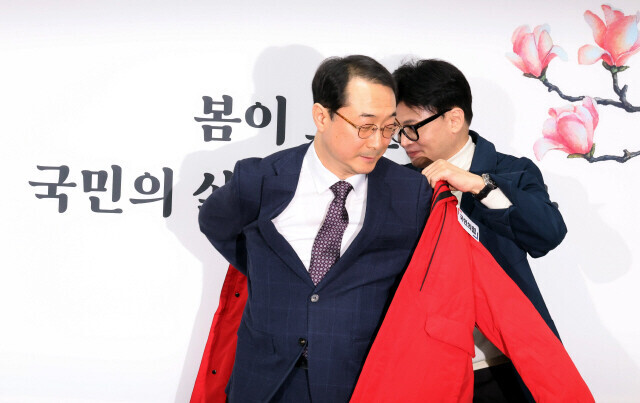hankyoreh
Links to other country sites 다른 나라 사이트 링크
[Editorial] The Yoon admin’s rebrand of the Office of Korean Peninsula Peace and Security Affairs is seriously concerning

South Korean Minister of Foreign Affairs Cho Tae-yul announced Thursday plans to rebrand the Office of Korean Peninsula Peace and Security Affairs, which has been in charge of negotiations regarding North Korean nuclear issues. The office has tentatively been renamed the Office of Diplomatic Strategy and Intelligence.
A respected organization that has overseen denuclearization talks on the Korean Peninsula for the past 18 years, ever since the six-party talks in 2006, will disappear into history.
Cho explained that the office was being disbanded in order to “expand the organization in line with the changing international geopolitical environment,” dismissing any claims that the organization’s functions are being eradicated or diminished.
However, as can be seen in the use of phrases such as “deterrence” and “cutting off funding” to describe the role of the new organization, it appears that the Yoon Suk-yeol administration will focus on intensifying sanctions and international pressure through global coordination rather than seeking dialogue with North Korea.
Meaningful attempts at dialogue to resolve North Korean nuclear threats have been on hold for more than four years, ever since the failure of the North Korea-US Hanoi summit of February 2019, which was followed by the subsequent failure of working-level talks in Stockholm, Sweden, in October of the same year.
In the meantime, the US has been building various networks to keep China in check, such as the Quadrilateral Security Dialogue (Quad), AUKUS (Australia, US, UK), and trilateral cooperation between the US, South Korea, and Japan. In the process, Washington has called on Seoul to focus on major global issues beyond the Korean Peninsula.
With inter-Korean negotiations in a lull, the government likely faced the conundrum of continuing to operate a large state organization, headed by a vice minister and comprising two bureaus and four divisions, when it essentially had no duties to fulfill.
Given the suspension of inter-Korean dialogue, Kim Geon hasn’t been able to make meaningful contact with North Korea even once since being appointed office director in May 2022. Kim then joined the ruling People Power Party (PPP) on Feb. 29, just one week before the office’s rebranding, which basically sums up the office’s current status.
But the fact remains that history has taught us that neglecting the North Korean nuclear issue just makes it harder to solve. During the two years since former President Moon Jae-in left office, the Biden administration has done nothing but repeat the message, “the door is always open to dialogue,” and the Yoon administration’s “audacious initiative,” which is predicated on North Korea voluntarily abandoning its nuclear program, is a nonstarter.
While dialogue has been on ice, North Korea has successfully demonstrated that it has the ability to strike the US homeland and launch more effective attacks on the South.
Although the situation on the Korean Peninsula is more perilous than ever before, there’s little chance that the Biden administration will turn its attention to North Korea given the upcoming presidential election in November and the ongoing wars in Ukraine and in Israel.
This is the time for the South Korean government to undertake meticulous diplomatic preparations for the aftermath of the US presidential election. That’s what makes the news about the Office of Korean Peninsula Peace and Security being reorganized at such a critical moment so troubling. The Yoon administration needs to return to the principle of resolving the North Korean nuclear issue through dialogue.
Please direct questions or comments to [english@hani.co.kr]

Editorial・opinion
![[Column] Season 2 of special prosecutor probe may be coming to Korea soon [Column] Season 2 of special prosecutor probe may be coming to Korea soon](https://flexible.img.hani.co.kr/flexible/normal/500/300/imgdb/original/2024/0426/3317141030699447.jpg) [Column] Season 2 of special prosecutor probe may be coming to Korea soon
[Column] Season 2 of special prosecutor probe may be coming to Korea soon![[Column] Park Geun-hye déjà vu in Yoon Suk-yeol [Column] Park Geun-hye déjà vu in Yoon Suk-yeol](https://flexible.img.hani.co.kr/flexible/normal/500/300/imgdb/original/2024/0424/651713945113788.jpg) [Column] Park Geun-hye déjà vu in Yoon Suk-yeol
[Column] Park Geun-hye déjà vu in Yoon Suk-yeol- [Editorial] New weight of N. Korea’s nuclear threats makes dialogue all the more urgent
- [Guest essay] The real reason Korea’s new right wants to dub Rhee a founding father
- [Column] ‘Choson’: Is it time we start referring to N. Korea in its own terms?
- [Editorial] Japan’s rewriting of history with Korea has gone too far
- [Column] The president’s questionable capacity for dialogue
- [Column] Are chaebol firms just pizza pies for families to divvy up as they please?
- [Column] Has Korea, too, crossed the Rubicon on China?
- [Correspondent’s column] In Japan’s alliance with US, echoes of its past alliances with UK
Most viewed articles
- 1‘We must say no’: Seoul defense chief on Korean, USFK involvement in hypothetical Taiwan crisis
- 2[Editorial] Korea’s surprise Q1 growth requires objective assessment, not blind fanfare
- 3[Column] Season 2 of special prosecutor probe may be coming to Korea soon
- 4Is Japan about to snatch control of Line messenger from Korea’s Naver?
- 5Division commander ordered troops to enter raging flood waters before Marine died, survivor says
- 6No good, very bad game for Korea puts it out of Olympics for first time since 1988
- 7S. Korea “monitoring developments” after report of secret Chinese police station in Seoul
- 8The dream K-drama boyfriend stealing hearts and screens in Japan
- 9[Column] ‘Choson’: Is it time we start referring to N. Korea in its own terms?
- 10Is N. Korea threatening to test nukes in response to possible new US-led sanctions body?